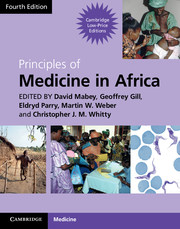Book contents
- Frontmatter
- Contents
- Contributors
- Foreword
- Section 1 Health and disease
- Section 2 Mother and child health
- 5 The pregnant patient
- 6 Neonatal care
- 7 The integrated management of childhood illness (IMCI)
- 8 Severe acute malnutrition in childhood
- 9 Diarrhoea
- 10 Pneumonia and other acute lower respiratory tract infections in children
- 11 Measles
- 12 Pertussis
- Section 3 Infection: general principles
- Section 4 Major common infections
- Section 5 Bacterial infections
- Section 6 Viral Infections
- Section 7 Protozoal infections
- Section 8 Helminth infections
- Section 9 Fungal infections
- Section 10 Non-communicable diseases
- Section 11 Diseases of body systems
- Section 12 Cancer and Palliative Care
- Section 13 Venoms and Poisons
- Index
- References
7 - The integrated management of childhood illness (IMCI)
from Section 2 - Mother and child health
Published online by Cambridge University Press: 05 March 2013
- Frontmatter
- Contents
- Contributors
- Foreword
- Section 1 Health and disease
- Section 2 Mother and child health
- 5 The pregnant patient
- 6 Neonatal care
- 7 The integrated management of childhood illness (IMCI)
- 8 Severe acute malnutrition in childhood
- 9 Diarrhoea
- 10 Pneumonia and other acute lower respiratory tract infections in children
- 11 Measles
- 12 Pertussis
- Section 3 Infection: general principles
- Section 4 Major common infections
- Section 5 Bacterial infections
- Section 6 Viral Infections
- Section 7 Protozoal infections
- Section 8 Helminth infections
- Section 9 Fungal infections
- Section 10 Non-communicable diseases
- Section 11 Diseases of body systems
- Section 12 Cancer and Palliative Care
- Section 13 Venoms and Poisons
- Index
- References
- Type
- Chapter
- Information
- Principles of Medicine in Africa , pp. 88 - 102Publisher: Cambridge University PressPrint publication year: 2013
References
- 1
- Cited by



